考研英语阅读部分历年真题及答案解析省纸打印版
考研英语真题试卷(题后含答案及解析)
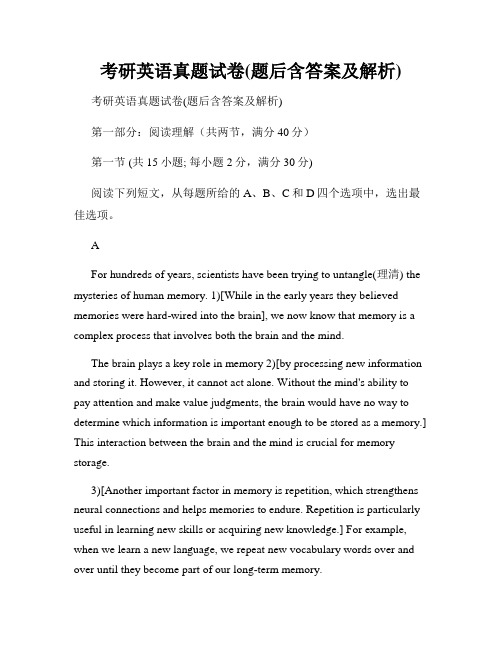
考研英语真题试卷(题后含答案及解析)考研英语真题试卷(题后含答案及解析)第一部分:阅读理解(共两节,满分40分)第一节 (共15小题; 每小题2分,满分30分)阅读下列短文,从每题所给的A、B、C和D四个选项中,选出最佳选项。
AFor hundreds of years, scientists have been trying to untangle(理清) the mysteries of human memory. 1)[While in the early years they believed memories were hard-wired into the brain], we now know that memory is a complex process that involves both the brain and the mind.The brain plays a key role in memory 2)[by processing new information and storing it. However, it cannot act alone. Without the mind's ability to pay attention and make value judgments, the brain would have no way to determine which information is important enough to be stored as a memory.] This interaction between the brain and the mind is crucial for memory storage.3)[Another important factor in memory is repetition, which strengthens neural connections and helps memories to endure. Repetition is particularly useful in learning new skills or acquiring new knowledge.] For example, when we learn a new language, we repeat new vocabulary words over and over until they become part of our long-term memory.Emotion is also closely related to memory. 4)[Emotional experiences tend to be more memorable than neutral ones.] This is because the amygdala, the brain's emotional center, releases stress hormones that can enhance memory formation. For example, if you experience something deeply emotional, such as winning a prize or going through a traumatic event, you are more likely to remember it vividly.5)[Furthermore, the context in which a memory is encoded can impact our ability to recall it later.] Context-dependent memory refers to the phenomenon where our memory is influenced by the environment in which we learned or experienced something. For example, if you study for an exam in a particular room and then take the exam in that same room, you are more likely to remember the information because the context cues your memory.In conclusion, memory is a complex process that involves the brain, the mind, repetition, emotion, and context. 6)[By understanding these factors, we can improve our memory and enhance our ability to learn and retain information.]1. According to the passage, what was the early belief about memory?A. It is a simple process controlled by the brain.B. It is a complex process involving both the brain and the mind.C. It is a natural ability of human beings.D. It is a hard-wired function of the mind.2. What is the role of the mind in memory storage?A. It determines which information is important.B. It processes new information and stores it.C. It helps repeat words and phrases.D. It releases stress hormones for memory formation.3. What does the passage say about repetition?A. It helps acquire new skills.B. It strengthens neural connections.C. It enhances emotional experiences.D. It cues memory in a particular context.4. Why are emotional experiences more memorable?A. They involve repetitive learning.B. They trigger the brain's emotional center.C. They release stress hormones for memory formation.D. They are associated with context-dependent memory.5. How does context impact memory recall?A. It determines the importance of information.B. It influences emotional experiences.C. It strengthens neural connections.D. It cues memory in a particular environment.6. What is the main purpose of the passage?A. To describe the complexities of human memory.B. To discuss the role of the brain in memory storage.C. To explain the connection between emotion and memory.D. To offer strategies for improving memory.解析:1. D。
考研英语真题完整版(含答案)
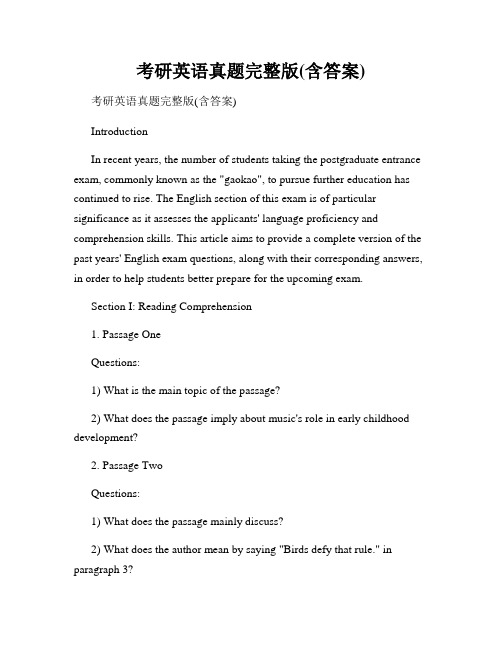
考研英语真题完整版(含答案)考研英语真题完整版(含答案)IntroductionIn recent years, the number of students taking the postgraduate entrance exam, commonly known as the "gaokao", to pursue further education has continued to rise. The English section of this exam is of particular significance as it assesses the applicants' language proficiency and comprehension skills. This article aims to provide a complete version of the past years' English exam questions, along with their corresponding answers, in order to help students better prepare for the upcoming exam.Section I: Reading Comprehension1. Passage OneQuestions:1) What is the main topic of the passage?2) What does the passage imply about music's role in early childhood development?2. Passage TwoQuestions:1) What does the passage mainly discuss?2) What does the author mean by saying "Birds defy that rule." in paragraph 3?Section II: Vocabulary and Structure1. Choose the word or phrase that best completes each sentence. Example:1) It is time that we ______ a solution to the problem.a) findb) will findc) foundd) have foundAnswer: a) findSection III: Cloze1. Choose the word or phrase that best fits the blank. Example:1) It was very kind ______ you to help me with my bags.a) forb) fromc) ofd) withAnswer: c) ofSection IV: TranslationTranslate the following sentences from Chinese to English.Example:1) 他们一起努力,最终实现了自己的目标。
考研英语历年英语阅读真题及答案
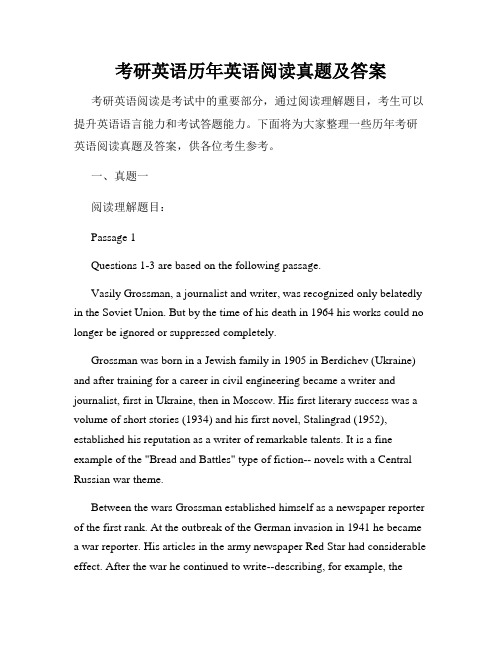
考研英语历年英语阅读真题及答案考研英语阅读是考试中的重要部分,通过阅读理解题目,考生可以提升英语语言能力和考试答题能力。
下面将为大家整理一些历年考研英语阅读真题及答案,供各位考生参考。
一、真题一阅读理解题目:Passage 1Questions 1-3 are based on the following passage.Vasily Grossman, a journalist and writer, was recognized only belatedly in the Soviet Union. But by the time of his death in 1964 his works could no longer be ignored or suppressed completely.Grossman was born in a Jewish family in 1905 in Berdichev (Ukraine) and after training for a career in civil engineering became a writer and journalist, first in Ukraine, then in Moscow. His first literary success was a volume of short stories (1934) and his first novel, Stalingrad (1952), established his reputation as a writer of remarkable talents. It is a fine example of the "Bread and Battles" type of fiction-- novels with a Central Russian war theme.Between the wars Grossman established himself as a newspaper reporter of the first rank. At the outbreak of the German invasion in 1941 he became a war reporter. His articles in the army newspaper Red Star had considerable effect. After the war he continued to write--describing, for example, the1943 Battle of Kursk in which a German advance was halted. These articles lead directly to the writing of Stalingrad.In 1959 his novel Life and Fate was finished, and when it became apparent that the manuscript would be suppressed by the authorities, Grossman gave copies to friends. A "textbook example of containment," the manuscript switched across the Iron Curtain and was first published in the West in 1980; in the Soviet Union only an abridged version was eventually published in 1988.Grossman's major themes are war and totalitarianism. He writes with great authority and humanity. In his later years he suffered from cruel persecution at the hands of the authorities and died a broken man.1. Vasily Grossman was initially recognized as a writer(A) during his lifetime(B) after his death(C) when his works were published in the West(D) after his works had been highly evaluated2. Grossman's first novel, Stalingrad, established his reputation by(A) describing a battle of the Second World War(B) criticizing the authorities' persecution(C) relating his post-war experience(D) criticizing totalitarianism3. Grossman's Life and Fate(A) was not praised as much as Stalingrad(B) was first published in the Soviet Union(C) was taken out of the Soviet Union in its entirety(D) was intended to show the effects of containment参考答案:1. A2. A3. C二、真题二阅读理解题目:Passage 2It is a common belief that emotions interfere with our reasoning abilities and lead to irrational decisions. However, recent studies have shown that emotions can actually be beneficial to the decision-making process.One study conducted by neuroscientist Antonio Damasio revealed that individuals with damage to a specific part of the brain had difficulty making decisions, even though their intelligence was not affected. This study suggests that emotions play a crucial role in our ability to make choices.Another study conducted by psychologists Loewenstein and Lerner found that individuals who experienced mild emotions during the decision-making process made better decisions compared to those who were emotionally neutral. This suggests that emotions can provide valuable information that can aid in decision-making.Furthermore, research has shown that individuals who are able to understand and regulate their emotions have better decision-making skills. This is because emotional intelligence allows individuals to consider both their rational thoughts and emotional responses when making decisions.In conclusion, emotions are not always detrimental to decision-making. They can provide valuable information and aid in the decision-making process. Additionally, individuals who possess emotional intelligence have better decision-making skills overall.4. According to the passage, recent studies have shown that emotions(A) interfere with our reasoning abilities(B) lead to irrational decisions(C) play a crucial role in decision-making(D) have no impact on decision-making5. The study conducted by Antonio Damasio suggests that individuals with damage to a specific part of the brain(A) have difficulty making decisions due to a lack of intelligence(B) have no emotional responses to aid in decision-making(C) are more likely to make irrational decisions(D) experience interference from their emotions when making decisions6. According to Loewenstein and Lerner's study, individuals who experienced mild emotions during the decision-making process(A) made better decisions compared to those who were emotionally neutral(B) were more likely to make irrational decisions(C) had difficulty making decisions due to a lack of emotional responses(D) had no impact on their decision-making abilities参考答案:4. C5. A6. A根据上述两道真题及其答案,我们可以看到考研英语阅读理解题目通常包括一篇或多篇文章,每篇文章后面配有若干问题,考生需要根据文章内容选择正确的答案。
考研英语真题阅读理解试题及答案分析
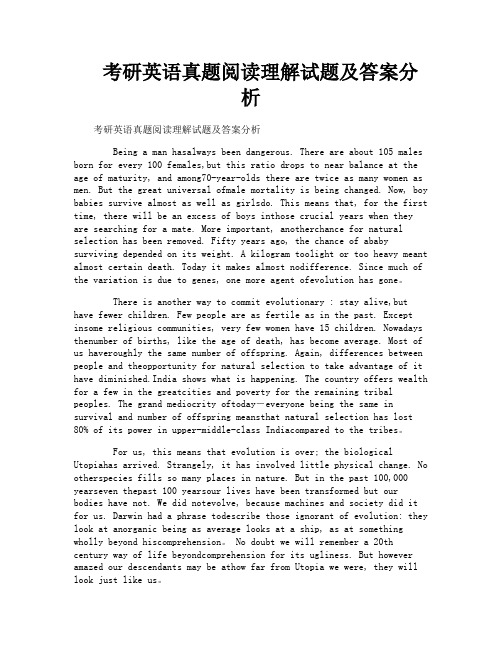
考研英语真题阅读理解试题及答案分析考研英语真题阅读理解试题及答案分析Being a man hasalways been dangerous. There are about 105 males born for every 100 females,but this ratio drops to near balance at the age of maturity, and among70-year-olds there are twice as many women as men. But the great universal ofmale mortality is being changed. Now, boy babies survive almost as well as girlsdo. This means that, for the first time, there will be an excess of boys inthose crucial years when they are searching for a mate. More important, anotherchance for natural selection has been removed. Fifty years ago, the chance of ababy surviving depended on its weight. A kilogram toolight or too heavy meant almost certain death. Today it makes almost nodifference. Since much of the variation is due to genes, one more agent ofevolution has gone。
There is another way to commit evolutionary : stay alive,but have fewer children. Few people are as fertile as in the past. Except insome religious communities, very few women have 15 children. Nowadays thenumber of births, like the age of death, has become average. Most of us haveroughly the same number of offspring. Again, differences between people and theopportunity for natural selection to take advantage of it have diminished.India shows what is happening. The country offers wealth for a few in the greatcities and poverty for the remaining tribal peoples. The grand mediocrity oftoday―everyone being the same in survival and number of offspring meansthat natural selection has lost 80% of its power in upper-middle-class Indiacompared to the tribes。
考研英语一阅读理解练习试题及答案解析
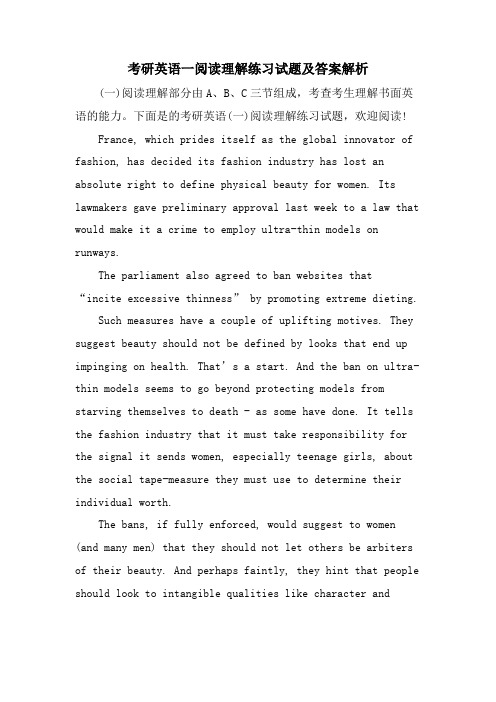
考研英语一阅读理解练习试题及答案解析(一)阅读理解部分由A、B、C三节组成,考查考生理解书面英语的能力。
下面是的考研英语(一)阅读理解练习试题,欢迎阅读!France, which prides itself as the global innovator of fashion, has decided its fashion industry has lost an absolute right to define physical beauty for women. Its lawmakers gave preliminary approval last week to a law that would make it a crime to employ ultra-thin models on runways.The parliament also agreed to ban websites that“incite excessive thinness” by promoting extreme dieting.Such measures have a couple of uplifting motives. They suggest beauty should not be defined by looks that end up impinging on health. That’s a start. And the ban on ultra-thin models seems to go beyond protecting models from starving themselves to death - as some have done. It tells the fashion industry that it must take responsibility for the signal it sends women, especially teenage girls, about the social tape-measure they must use to determine their individual worth.The bans, if fully enforced, would suggest to women (and many men) that they should not let others be arbiters of their beauty. And perhaps faintly, they hint that people should look to intangible qualities like character andintellect rather than dieting their way to size zero or wasp-waist physiques.The French measures, however, rely too much on severe punishment to change a culture that still regards beauty as skin-deep — and bone-showing. Under the law, using a fashion model that does not meet a government-defined index of body mass could result in a $85,000 fine and six monthsin prison.The fashion industry knows it has an inherent problemin focusing on material adornment and idealized body types. In Denmark, the United States, and a few other countries,it is trying to set voluntary standards for models and fashion images that rely more on peer pressure for enforcement.In contrast to France’s actions, Denmark’s fashion industry agreed last month on rules and sanctions regarding the age, health, and other characteristics of models. The newly revised Danish Fashion Ethical Charter clearly states: “We are aware of and take responsibility for the impactthe fashion industry has on body ideals, especially onyoung people.’ The charter’s main tool of enforcement isto deny aess for designers and modeling agencies to Copenhagen Fashion Week, which is run by the Danish Fashion Institute. But in general it relies on a name-and-shame method of pliance.Relying on ethical persuasion rather than law to address the misuse of body ideals may be the best step. Even better would be to help elevate notions of beauty beyond the material standards of a particular industry.21. Aording to the first paragraph, what would happen in France?[A] Physical beauty would be redefined.[B] New runways would be constructed.[C] Websites about dieting would thrive.[D] The fashion industry would decline.【答案】 [A] Physical beauty would be redefined【解析】推断题。
考研历年英语试题及答案
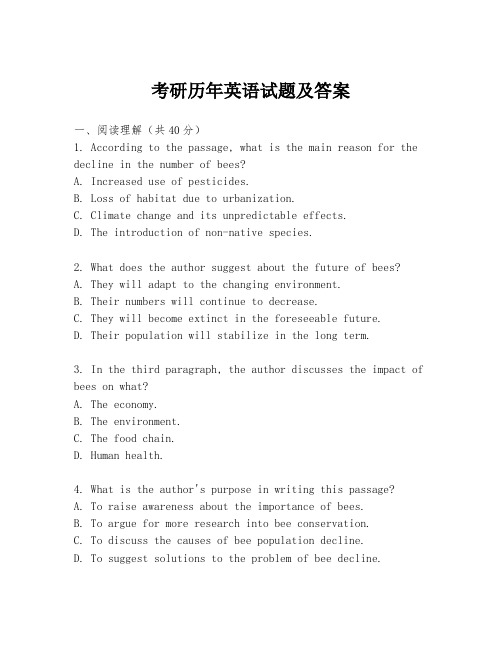
考研历年英语试题及答案一、阅读理解(共40分)1. According to the passage, what is the main reason for the decline in the number of bees?A. Increased use of pesticides.B. Loss of habitat due to urbanization.C. Climate change and its unpredictable effects.D. The introduction of non-native species.2. What does the author suggest about the future of bees?A. They will adapt to the changing environment.B. Their numbers will continue to decrease.C. They will become extinct in the foreseeable future.D. Their population will stabilize in the long term.3. In the third paragraph, the author discusses the impact of bees on what?A. The economy.B. The environment.C. The food chain.D. Human health.4. What is the author's purpose in writing this passage?A. To raise awareness about the importance of bees.B. To argue for more research into bee conservation.C. To discuss the causes of bee population decline.D. To suggest solutions to the problem of bee decline.二、完形填空(共20分)5. The word "abundant" in the first sentence is closest in meaning to _______.A. numerousB. diverseC. scarceD. unique6. The author's tone in the passage can best be described as _______.A. optimisticB. pessimisticC. informativeD. persuasive7. The phrase "in the face of" in the second paragraph is used to mean _______.A. despiteB. in front ofC. as a result ofD. because of8. The word "vulnerable" in the third paragraph is closest in meaning to _______.A. strongB. weakC. adaptableD. resistant9. The author uses the example of the almond industry to_______.A. illustrate the economic impact of bee declineB. demonstrate the importance of bees in agricultureC. emphasize the adaptability of beesD. argue for more funding for bee research10. The word "contribute" in the last paragraph is closest in meaning to _______.A. donateB. causeC. addD. result三、翻译(共20分)11. 将以下句子翻译成英文:蜜蜂对维持生态平衡至关重要,但近年来它们的数量急剧下降。
考研英语一真题及答案解析-完整版
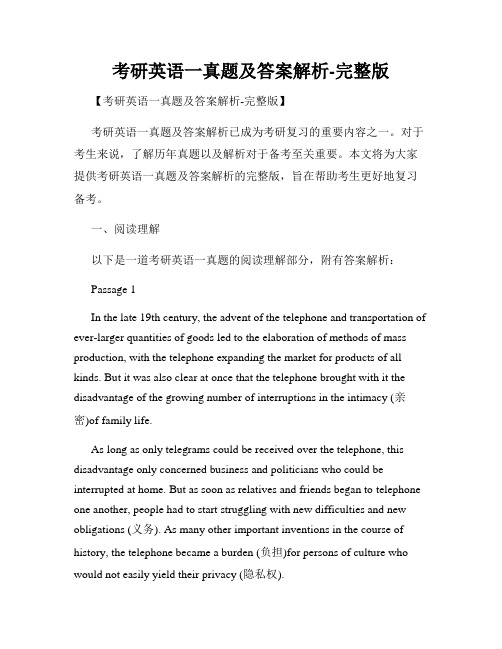
考研英语一真题及答案解析-完整版【考研英语一真题及答案解析-完整版】考研英语一真题及答案解析已成为考研复习的重要内容之一。
对于考生来说,了解历年真题以及解析对于备考至关重要。
本文将为大家提供考研英语一真题及答案解析的完整版,旨在帮助考生更好地复习备考。
一、阅读理解以下是一道考研英语一真题的阅读理解部分,附有答案解析:Passage 1In the late 19th century, the advent of the telephone and transportation of ever-larger quantities of goods led to the elaboration of methods of mass production, with the telephone expanding the market for products of all kinds. But it was also clear at once that the telephone brought with it the disadvantage of the growing number of interruptions in the intimacy (亲密)of family life.As long as only telegrams could be received over the telephone, this disadvantage only concerned business and politicians who could be interrupted at home. But as soon as relatives and friends began to telephone one another, people had to start struggling with new difficulties and new obligations (义务). As many other important inventions in the course of history, the telephone became a burden (负担)for persons of culture who would not easily yield their privacy (隐私权).With the invention of the telephone, ways had to be found to establish rules as to when and by whom telephone calls could be made without interrupting. The telephone, in order to be acceptable, had to bear certain qualities which were also valid for other cultural goods – mainly the quality to bring people toward one another and to integrate (整合)them into the common world.These results could, however, be achieved only by the contribution of a large number of people who followed certain rules of behavior with regard to the telephone. But such rules had to be collectively established, they had to be known and accepted by everyone; it would not have been sufficient if only a few informed persons, acting in a purely academic capacity =by themselves, had found them out and had spread (传播)them – that is, if people had known the rules only in the abstract.As soon as propriety (礼节)became a matter of public interest, the invention of the telephone brought about the establishment of a teachers of telephone behavior – professors who explained the norms (规范)of telephone behavior, who taught people how to accept messages, how to make a call politely and yet firmly (委婉), how to end calls courteously (谦虚地), and how to use a telephone correctly. These professors were also at the service of companies and private persons for individual consultation on the same topics. Thanks to these people the invasion of privacy by telephone could be tempered (缓和), the annoyance (麻烦) of being interrupted by telephone calls could be reduced.11. According to the passage, the advent of the telephone led to ______.A) an almost immediate invasion of privacyB) the formation of new obligationsC) the integration of business and politicsD) the expansion of the market for various products答案解析:D) the expansion of the market for various products.解析:根据文章的第一句“In the late 19th century, the advent of the telephone and transportation of ever-larger quantities of goods led to the elaboration of methods of mass production.”可知,电话的出现推动了商品市场的扩大。
历年考研英语真题阅读理解试题及名师解析汇总共10套
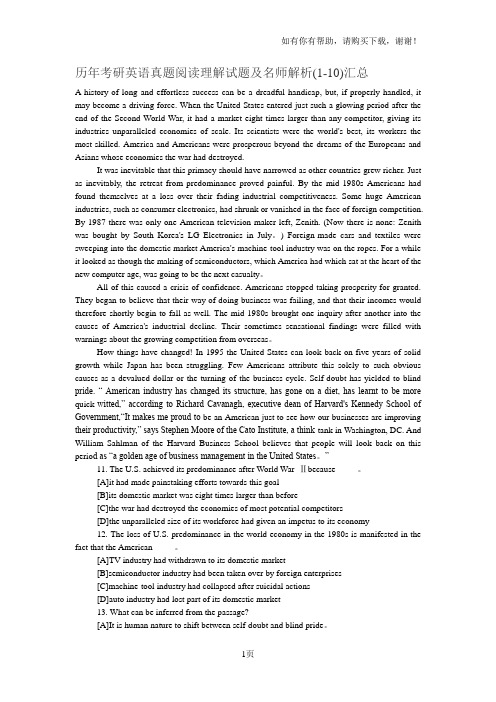
历年考研英语真题阅读理解试题及名师解析(1-10)汇总A history of long and effortless success can be a dreadful handicap, but, if properly handled, it may become a driving force. When the United States entered just such a glowing period after the end of the Second World War, it had a market eight times larger than any competitor, giving its industries unparalleled economies of scale. Its scientists were the world's best, its workers the most skilled. America and Americans were prosperous beyond the dreams of the Europeans and Asians whose economies the war had destroyed.It was inevitable that this primacy should have narrowed as other countries grew richer. Just as inevitably, the retreat from predominance proved painful. By the mid-1980s Americans had found themselves at a loss over their fading industrial competitiveness. Some huge American industries, such as consumer electronics, had shrunk or vanished in the face of foreign competition. By 1987 there was only one American television maker left, Zenith. (Now there is none: Zenith was bought by South Korea's LG Electronics in July。
考研英语试题精解及答案

考研英语试题精解及答案一、阅读理解(共40分)1. 根据文章内容,以下哪个选项是正确的?A. 作者支持全球化。
B. 作者认为全球化对环境有害。
C. 作者认为全球化对经济有益。
D. 作者反对全球化。
答案:C2. 文章中提到的“可持续发展”是指什么?A. 经济增长不牺牲环境。
B. 经济增长以牺牲环境为代价。
C. 只关注经济增长,不考虑其他因素。
D. 只关注环境保护,不考虑经济增长。
答案:A3. 根据文章,以下哪个选项是错误的?A. 发展中国家需要全球化来促进经济增长。
B. 发达国家在全球化中扮演着重要角色。
C. 作者认为全球化是不可逆的趋势。
D. 作者认为全球化是有害的。
答案:D4. 文章中提到的“绿色经济”是什么意思?A. 一种以牺牲环境为代价的经济模式。
B. 一种注重环境保护的经济模式。
C. 一种只关注经济发展的经济模式。
D. 一种不关心经济和环境的经济模式。
答案:B5. 文章中提到的“碳足迹”是指什么?A. 个人或组织对环境的污染程度。
B. 个人或组织对经济的贡献。
C. 个人或组织的社会影响力。
D. 个人或组织的政治影响力。
答案:A二、完形填空(共20分)阅读下面短文,从A、B、C、D四个选项中,选出最佳选项。
In recent years, the concept of a "smart city" has become increasingly popular. A smart city is one that uses technology to improve the quality of life for its residents. For example, a smart city might use sensors to monitortraffic flow and __6__ congestion.6. A. reduceB. increaseC. avoidD. ignore答案:A7. These sensors can also be used to monitor air quality and__7__ any potential health hazards.7. A. identifyB. createC. ignoreD. exaggerate答案:A8. In addition to improving transportation and environmental conditions, smart cities can also __8__ energy use.8. A. increaseB. decreaseC. stabilizeD. fluctuate答案:B9. By using smart grids and energy-efficient buildings, a smart city can __9__ a significant amount of energy.9. A. consumeB. conserveC. wasteD. transfer答案:B10. The ultimate goal of a smart city is to create a more__10__ and sustainable living environment for its citizens.10. A. comfortableB. expensiveC. inconvenientD. unsustainable答案:A三、翻译(共20分)将下列句子从英文翻译成中文。
考研英语一真题及答案解析完整版
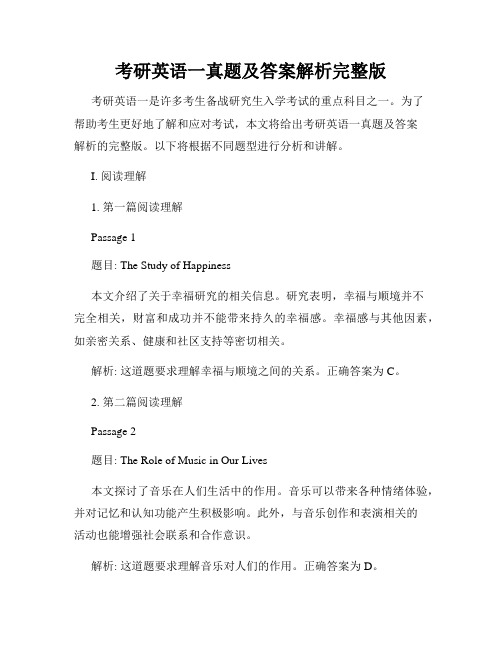
考研英语一真题及答案解析完整版考研英语一是许多考生备战研究生入学考试的重点科目之一。
为了帮助考生更好地了解和应对考试,本文将给出考研英语一真题及答案解析的完整版。
以下将根据不同题型进行分析和讲解。
I. 阅读理解1. 第一篇阅读理解Passage 1题目: The Study of Happiness本文介绍了关于幸福研究的相关信息。
研究表明,幸福与顺境并不完全相关,财富和成功并不能带来持久的幸福感。
幸福感与其他因素,如亲密关系、健康和社区支持等密切相关。
解析: 这道题要求理解幸福与顺境之间的关系。
正确答案为C。
2. 第二篇阅读理解Passage 2题目: The Role of Music in Our Lives本文探讨了音乐在人们生活中的作用。
音乐可以带来各种情绪体验,并对记忆和认知功能产生积极影响。
此外,与音乐创作和表演相关的活动也能增强社会联系和合作意识。
解析: 这道题要求理解音乐对人们的作用。
正确答案为D。
II. 翻译1. 英译汉题目: There are many benefits to learning a foreign language. First, it helps you communicate with people from different cultures. Second, it improves your cognitive skills and memory. Finally, it opens up new career opportunities.解析: 这道题要求将英语句子翻译成中文。
正确答案为学习一门外语有很多好处。
首先,它帮助你和来自不同文化的人进行交流。
其次,它提高了你的认知能力和记忆力。
最后,它为你打开了新的职业机会。
2. 汉译英题目: 学习一门外语对个人发展有积极影响。
首先,它培养了人们的跨文化交际能力。
其次,它拓宽了人们的视野。
最后,它提升了就业竞争力。
考研英语试题及答案详解
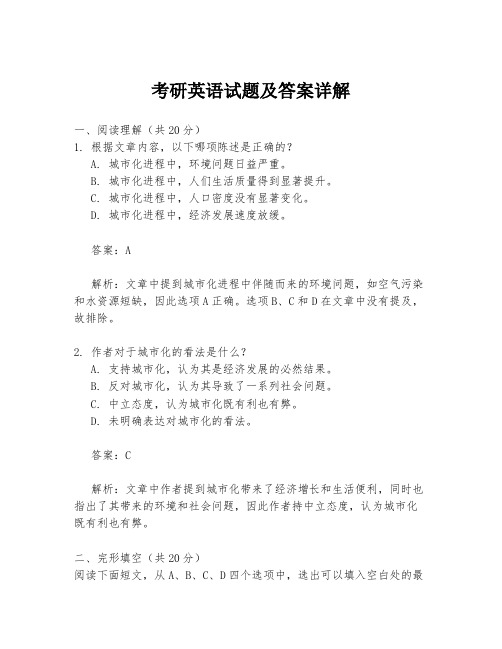
考研英语试题及答案详解一、阅读理解(共20分)1. 根据文章内容,以下哪项陈述是正确的?A. 城市化进程中,环境问题日益严重。
B. 城市化进程中,人们生活质量得到显著提升。
C. 城市化进程中,人口密度没有显著变化。
D. 城市化进程中,经济发展速度放缓。
答案:A解析:文章中提到城市化进程中伴随而来的环境问题,如空气污染和水资源短缺,因此选项A正确。
选项B、C和D在文章中没有提及,故排除。
2. 作者对于城市化的看法是什么?A. 支持城市化,认为其是经济发展的必然结果。
B. 反对城市化,认为其导致了一系列社会问题。
C. 中立态度,认为城市化既有利也有弊。
D. 未明确表达对城市化的看法。
答案:C解析:文章中作者提到城市化带来了经济增长和生活便利,同时也指出了其带来的环境和社会问题,因此作者持中立态度,认为城市化既有利也有弊。
二、完形填空(共20分)阅读下面短文,从A、B、C、D四个选项中,选出可以填入空白处的最佳选项。
In recent years, the popularity of online courses has grown rapidly. The reason is that they offer flexibility and convenience that traditional classroom learning often cannot match. For example, students can access the courses at any time and from any place, which is particularly beneficial for those who have to balance their studies with work or family commitments.3. The word "flexibility" in the passage most probably means ______.A. the ability to change easilyB. the ability to bend easilyC. the ability to stretch easilyD. the ability to move easily答案:A解析:根据上下文,"flexibility"在这里指的是在线课程提供的时间上的灵活性,即学生可以根据自己的时间安排来学习,因此选项A"the ability to change easily"是最佳选项。
历年考研英语阅读真题及答案解析
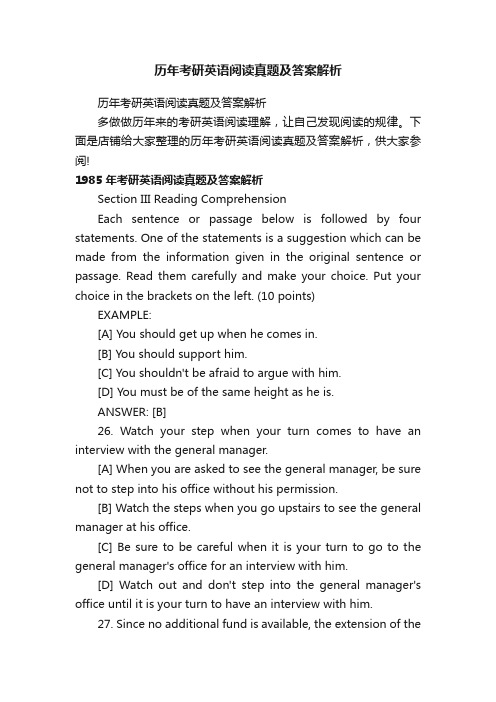
历年考研英语阅读真题及答案解析历年考研英语阅读真题及答案解析多做做历年来的考研英语阅读理解,让自己发现阅读的规律。
下面是店铺给大家整理的历年考研英语阅读真题及答案解析,供大家参阅!1985年考研英语阅读真题及答案解析Section III Reading ComprehensionEach sentence or passage below is followed by four statements. One of the statements is a suggestion which can be made from the information given in the original sentence or passage. Read them carefully and make your choice. Put your choice in the brackets on the left. (10 points)EXAMPLE:[A] You should get up when he comes in.[B] You should support him.[C] You shouldn't be afraid to argue with him.[D] You must be of the same height as he is.ANSWER: [B]26. Watch your step when your turn comes to have an interview with the general manager.[A] When you are asked to see the general manager, be sure not to step into his office without his permission.[B] Watch the steps when you go upstairs to see the general manager at his office.[C] Be sure to be careful when it is your turn to go to the general manager's office for an interview with him.[D] Watch out and don't step into the general manager's office until it is your turn to have an interview with him.27. Since no additional fund is available, the extension of thebuilding is out of the question.[A] The extension of the building is impossible because we are unable to get extra fund for the purpose.[B] There is some problem about the extension of the building owing to lack of fund.[C] Since no additional fund is available, we have to solve the problem regarding the extension of the building with our own resources.[D] We can undertake the extension of the building even without additional fund. It is no problem at all.28. All along he has been striving not to fall short of his parents' expectations.[A] He has been trying hard all the time to live up to what his parents expect of him.[B] His parents have been expecting him to work hard.[C] All the time he has been trying hard to balance himself so as not to fall down as his parents thought he would.[D] All the time, as his parents expect him to do, he has been trying hard to save and not to be short of money.29. The various canals which drain away the excessive water have turned this piece of land into a highly productive agricultural area.[A] The canals have been used to water the land.[B] The canals have been used to raise agricultural production.[C] Excessive water has been helpful to agricultural production.[D] The production has been mainly agricultural.30. The replacement of man by machines has not led to unemployment. On the contrary, the total numbers engaged inthe textile industry have continued to rise. The fact should not be ignored by those who maintain that unemployment and machinery are inseparable companions.[A] The belief that the use of machinery causes unemployment is unfounded.[B] The use of machinery results in a rise in production.[C] Many people lose their jobs when machines are introduced.[D] Contrary to general belief, machinery and unemployment are inseparable companions.答案解析Section III: Reading Comprehension (10 points)26.[C]27.[A]28.[A]29.[B]30.[A]1986年考研英语阅读真题及答案解析Section III Reading ComprehensionEach of the two passages below is followed by five questions. For each question there are four answers. Read the passages carefully and choose the best answer to each of the questions. Put your choice in the brackets on the left. (10 points) Text 1There are a great many careers in which the increasing emphasis is on specialization. You find these careers in engineering, in production, in statistical work, and in teaching. But there is an increasing demand for people who are able to take in great area at a glance, people who perhaps do not know too much about any one field. There is, in other words, a demand for people who are capable of seeing the forest rather than the trees, of making general judgments. We can call these people “generalists.” And these “generalists” are particularly needed for positions in administration, where it is their job to see thatother people do the work, where they have to plan for other people, to organize other people’s work, to begin it and judge it.The specialist understands one field; his concern is with technique and tools. He is a “trained” man; and his educationa l background is properly technical or professional. The generalist -- and especially the administrator -- deals with people; his concern is with leadership, with planning, and with direction giving. He is an “educated” man; and the humanities are his strongest foundation. Very rarely is a specialist capable of being an administrator. And very rarely is a good generalist also a good specialist in particular field. Any organization needs both kinds of people, though different organizations need them in different proportions. It is your task to find out, during your training period, into which of the two kinds of jobs you fit, and to plan your career accordingly.Your first job may turn out to be the right job for you -- but this is pure accident. Certainly you should not change jobs constantly or people will become suspicious of your ability to hold any job. At the same time you must not look upon the first job as the final job; it is primarily a training job, an opportunity to understand yourself and your fitness for being an employee.26. There is an increasing demand for ________.[A] all round people in their own fields[B] people whose job is to organize other people’s work[C] generalists whose educational background is either technical or professional[D] specialists whose chief concern is to provide administrative guidance to others27. The specialist is ________.[A] a man whose job is to train other people[B] a man who has been trained in more than one fields[C] a man who can see the forest rather than the trees[D] a man whose concern is mainly with technical or professional matters28. The administrator is ________.[A] a “trained” man who is more a specialist than a generalist[B] a man who sees the trees as well as the forest[C] a man who is very strong in the humanities[D] a man who is an “educated” specialist29. During your training period, it is important ________.[A] to try to be a generalist[B] to choose a profitable job[C] to find an organization which fits you[D] to decide whether you are fit to be a specialist or a generalist30. A man’s first job ________.[A] is never the right job for him[B] should not be regarded as his final job[C] should not be changed or people will become suspicious of his ability to hold any job[D] is primarily an opportunity to fit himself for his final jobText 2At the bottom of the world lies a mighty continent still wrapped in the Ice Age and, until recent times, unknown to man. It is a great land mass with mountain ranges whose extent and elevation are still uncertain. Much of the continent is a complete blank on our maps. Man has explored, on foot, less than one per cent of its area. Antarctica differs fundamentally from the Arcticregions. The Arctic is an ocean, covered with drifting packed ice and hemmed in by the land masses of Europe, Asia, and North America. The Antarctic is a continent almost as large as Europe and Australia combined, centered roughly on the South Pole and surrounded by the most unobstructed water areas of the world -- the Atlantic, Pacific, and Indian Oceans.The continental ice sheet is more than two miles high in its centre, thus, the air over the Antarctic is far more refrigerated than it is over the Arctic regions. This cold air current from the land is so forceful that it makes the nearby seas the stormiest in the world and renders unlivable those regions whose counterparts at the opposite end of the globe are inhabited. Thus, more than a million persons live within 2,000 miles of the North Pole in an area that includes most of Alaska, Siberia, and Scandinavia -- a region rich in forest and mining industries. Apart from a handful of weather stations, within the same distance of the South Pole there is not a single tree, industry, or settlement.31. The best title for this selection would be ________.[A] Iceland[B] Land of Opportunity[C] The Unknown Continent[D] Utopia at Last32. At the time this article was written, our knowledge of Antarctica was ________.[A] very limited[B] vast[C] fairly rich[D] nonexistent33. Antarctica is bordered by the ________.[A] Pacific Ocean[B] Indian Ocean[C] Atlantic Ocean[D] All three34. The Antarctic is made uninhabitable primarily by ________.[A] cold air[B] calm seas[C] ice[D] lack of knowledge about the continent35. According to this article ________.[A] 2,000 people live on the Antarctic Continent[B] a million people live within 2,000 miles of the South Pole[C] weather conditions within a 2,000 mile radius of the South Pole make settlements impractical[D] only a handful of natives inhabit Antarctica答案解析Section III: Reading Comprehension (10 points)26.[B]27.[D]28.[C]29.[D]30.[B]31.[C]32.[A]33.[D]34.[A]35.[C]1987年考研英语阅读真题及答案解析Section II Reading ComprehensionEach of three passages below is followed by five questions. For each question there are four answers, read the passages carefully and choose the best answer to each of the questions. Put your choice in the ANSWER SHEET. (15 points)Text 1For centuries men dreamed of achieving vertical flight. In 400 A.D. Chinese children played with a fan-like toy that spun upwards and fell back to earth as rotation ceased. Leonardo da Vinci conceive the first mechanical apparatus, called a “Helix,” which could carry man straight up, but was only a design and wasnever tested.The ancient-dream was finally realized in 1940 when a Russian engineer piloted a strange looking craft of steel tubing with a rotating fan on top. It rose awkwardly and vertically into the air from a standing start, hovered a few feet above the ground, went sideways and backwards, and then settled back to earth. The vehicle was called a helicopter.Imaginations were fired. Men dreamed of going to work in their own personal helicopters. People anticipate that vertical flight transports would carry millions of passengers as do the airliners of today. Such fantastic expectations were not fulfilled.The helicopter has now become an extremely useful machine. It excels in military missions, carrying troops, guns and strategic instruments where other aircraft cannot go. Corporations use them as airborne offices, many metropolitan areas use them in police work, construction and logging companies employ them in various advantageous ways, engineers use them for site selection and surveying, and oil companies use them as the best way to make offshore and remote work stations accessible to crews and supplies. Any urgent mission to a hard-to-get-to place is a likely task for a helicopter. Among their other multitude of used: deliver people across town, fly to and from airports, assist in rescue work, and aid in the search for missing or wanted persons.11. People expect that ________.[A] the airliners of today would eventually be replaced by helicopters[B] helicopters would someday be able to transport large number of people from place to place as airliners are now doing[C] the imaginations fired by the Russian engineer’sinvention would become a reality in the future[D] their fantastic expectations about helicopters could be fulfilled by airliners of today12. Helicopters work with the aid of ________.[A] a combination of rotating devices in front and on top[B] a rotating device topside[C] one rotating fan in the center of the aircraft and others at each end[D] a rotating fan underneath for lifting13. What is said about the development of the helicopter?[A] Helicopters have only been worked on by man since 1940.[B] Chinese children were the first to achieve flight in helicopters.[C] Helicopters were considered more dangerous than the early airplanes.[D] Some people thought they would become widely used by average individuals.14. How has the use of helicopters developed?[A] They have been widely used for various purposes.[B] They are taking the place of high-flying jets.[C] They are used for rescue work.[D] They are now used exclusively for commercial projects.15. Under what conditions are helicopters found to be absolutely essential?[A] For overseas passenger transportation.[B] For extremely high altitude flights.[C] For high-speed transportation.[D] For urgent mission to places inaccessible to other kinds of craft.Text 2In ancient Greece athletic festivals were very important and had strong religious associations. The Olympian athletic festival held every four years in honor of Zeus, king of the Olympian Gods, eventually lost its local character, became first a national event and then, after the rules against foreign competitors had been abolished, international. No one knows exactly how far back the Olympic Games go, but some official records date from 776 B.C. The games took place in August on the plain by Mount Olympus. Many thousands of spectators gathered from all parts of Greece, but no married woman was admitted even as a spectator. Slaves, women and dishonored persons were not allowed to compete. The exact sequence of events uncertain, but events included boy’s gymnastics, boxing, wrestling, horse racing and field events, though there were fewer sports involved than in the modern Olympic Games.On the last day of the Games, all the winners were honored by having a ring of holy olive leaves placed on their heads. So great was the honor that the winner of the foot race gave his name to the year of his victory. Although Olympic winners received no prize money, they were, in fact, richly rewarded by their state authorities. How their results compared with modern standards, we unfortunately have no means of telling.After an uninterrupted history of almost 1,200 years, the Games were suspended by the Romans in 394 A.D. They continued for such a long time because people believed in the philosophy behind the Olympics: the idea that a healthy body produced a healthy mind, and that the spirit of competition in sports and games was preferable to the competition that caused wars. It was over 1,500 years before another such international athletic gathering took place in Athens in 1896.Nowadays, the Games are held in different countries in turn. The host country provides vast facilities, including a stadium, swimming pools and living accommodation, but competing courtiers pay their own athletes’ expenses.The Olympics start with the arrival in the stadium of a torch, lighted on Mount Olympus by the sun’s rays. It is carried by a succession of runners to the stadium. The torch symbolized the continuation of the ancient Greek athletic ideals, and it burns throughout the Games until the closing ceremony. The well-known Olympic flag, however, is a modern conception: the five interlocking rings symbolize the uniting of all five continents participating in the Games.16. In ancient Greece, the Olympic Games ________.[A] were merely national athletic festivals[B] were in the nature of a national event with a strong religious colour[C] had rules which put foreign participants in a disadvantageous position[D] were primarily national events with few foreign participants17. In the early days of ancient Olympic Games ________.[A] only male Greek athletes were allowed to participate in the games[B] all Greeks, irrespective of sex, religion or social status, were allowed to take part[C] all Greeks, with the exception of women, were allowed to compete in Games[D] all male Greeks were qualified to compete in the Games18. The order of athletic events at the ancient Olympics ________.[A] has not definitely been established[B] varied according to the number of foreign competitors[C] was decided by Zeus, in whose honor the Games were held[D] was considered unimportant19. Modern athletes’ results cannot be compared with those of ancient runners because ________.[A] the Greeks had no means of recording the results[B] they are much better[C] details such as the time were not recorded in the past[D] they are much worse20. Nowadays, the athletes’ expenses are paid for ________.[A] out of the prize money of the winners[B] out of the funds raised by the competing nations[C] by the athletes themselves[D] by contributions焦点导航考研英语完型 | 考研英语真题 | 考研英语阅读 | 考研英语翻译 | 考研英语经验交流考研英语作文 | 考研常见问题 | 专家解读Text 3In science the meaning of the word “explain” suffers with civilization’s every step in search of reality. Science cannot really explain electricity, magnetism, and gravitation; their effects can be measured and predicted, but of their nature no more is known to the modern scientist than to Thales who first looked into the nature of the electrification of amber, a hard yellowish-brown gum. Most contemporary physicists reject the notion that man can ever discover what these mysterious forces “really” are. “Electricity,” Bertrand Russell says, “is not a thing, like St.Paul’s Cathe dral; it is a way in which things behave. When we have told how things behave when they are electrified, and under what circumstances they are electrified, we have told all there is to tell.” Until recently scientists would have disapproved of such an idea. Aristotle, for example, whose natural science dominated Western thought for two thousand years, believed that man could arrive at an understanding of reality by reasoning from self-evident principles. He felt, for example, that it is a self-evident principle that everything in the universe has its proper place, hence one can deduce that objects fall to the ground because that’s where they belong, and smoke goes up because that’s where it belongs. The goal of Aristotelian science was to explain why things happen. Modern science was born when Galileo began trying to explain how things happen and thus originated the method of controlled experiment which now forms the basis of scientific investigation.21. The aim of controlled scientific experiments is ________.[A] to explain why things happen[B] to explain how things happen[C] to describe self-evident principles[D] to support Aristotelian science22. What principles most influenced scientific thought for two thousand years?[A] the speculations of Thales[B] the forces of electricity, magnetism, and gravity[C] Aristotle’s natural science[D] Galileo’s discoveries23. Bertrand Russell’s notion about electricity is ________.[A] disapproved of by most modern scientists[B] in agreement with Aristotle’s theo ry of self-evidentprinciples[C] in agreement with scientific investigation directed toward “how” things happen[D] in agreement with scientific investigation directed toward “why” things happen24. The passage says that until recently scientists disagreed with the idea ________.[A] that there are mysterious forces in the universe[B] that man cannot discover what forces “really” are[C] that there are self-evident principles[D] that we can discover why things behave as they do25. Modern science came into being ________.[A] when the method of controlled experiment was first introduced[B] when Galileo succeeded in explaining how things happen[C] when Aristotelian scientist tried to explain why things happen[D] when scientists were able to acquire an understanding of reality of reasoning[C] grants[D] credits答案解析Section II: Reading Comprehension (15 points)11.[B]12.[B]13.[D]14.[A]15.[D]16.[B]17.[A]18.[A]19.[C]20.[B]21.[B]22.[C]23.[C]24.[B]25.[A]1988年考研英语阅读真题及答案解析Section II Reading ComprehensionEach of the three passages below is followed by some questions. For each question there are four answers. Read thepassages carefully and chose the best answer to each of the questions. Put your choice in the ANSWER SHEET. (20 points) Text 1It doesn’t com e as a surprise to you to realize that it makes no difference what you read or study if you can’t remember it. You just waste your valuable time. Maybe you have already discovered some clever ways to keep yourself from forgetting.One dependable aid that does help you remember what you study is to have a specific purpose or reason for reading. You remember better what you read when you know why you’re reading.Why does a clerk in a store go away and leave you when your reply to her offer to help is, “No, thank you. I’m just looking”? Both you and she know that if you aren’t sure what you want, you are not likely to find it. But suppose you say instead, “Yes, thank you. I want a pair of sun glasses.” She says, “Right this way, please.” And you and she are off -- both eager to look for exactly what you want.It’s quite the same with your studying. If you chose a book at random, “just looking” for nothing in particular, you are likely to get just that -- nothing. But if you do know what you want, and if you have the right book, you are almost sure to get it. Your reasons will vary; they will include reading or studying “to find out more about”, “to understand the reasons for”, “to find out how”. A good student has a clear purpose or reason for what he is doing.This is the way it works. Before you start to study, you say to yourself something like this, “I want to know why Stephen Vincent Benet happened to write about America. I’m reading this article to find out.” Or, “I’m going to skim this story tosee what lif e was like in medieval England.” Because you know why you are reading or studying, you relate the information to your purpose and remember it better.Reading is not one single activity. At least two important processes go on at the same time. As you read, you take in ideas rapidly and accurately. But at the same time you express your own ideas to yourself as you react to what you read. You have a kind of mental conversation with the author. If you expressed your ideas orally, they might sound like this: “Ye s, I agree. That’s my opinion too.” or “Ummmm, I thought that record was broken much earlier. I’d better check those dates,” or “But there are some other facts to be considered!” You don’t just sit there taking in ideas -- you do something else, and that something else is very important.This additional process of thinking about what you read includes evaluating it, relating it to what you already know, and using it for your own purposes. In other words, a good reader is a critical reader. One part of critical reading, as you have discovered, is distinguishing between facts and opinions. Facts can be checked by evidence. Opinions are one’s own personal reactions.Another part of critical reading is judging sources. Still another part is drawing accurate inferences.16. If you cannot remember what you read or study, ________.[A] it is no surprise[B] it means you have not really learned anything[C] it means you have not chosen the right book[D] you realize it is of no importance17. Before you start reading, it is important ________.[A] to make sure why you are reading[B] to relate the information to your purpose[C] to remember what you read[D] to choose an interesting book18. Reading activity involves ________.[A] only two simultaneous processes[B] primarily learning about ideas and evaluating them critically[C] merely distinguishing between facts and opinions[D] mainly drawing accurate inferences19. A good reader is one who ________.[A] relates what he reads to his own knowledge about the subject matter[B] does lots of thinking in his reading[C] takes a critical attitude in his reading[D] is able to check the facts presented against what he has already knownText 2If you live in a large city, you are quite familiar with some of the problems of noise, but because of some of its harmful effects, you may not be aware of the extent of its influence on human behavior. Although everyone more or less knows what noise is, i.e., it is sounds that one would rather not hear, it is perhaps best to define it more precisely for scientific purposes. One such definition is that noise is sounds that are unrelated to the task at hand. Thus stimuli that at one time might be considered relevant will at another time be considered noise, depending on what one is doing at the moment. In recent years there has been a great deal of interest in the effects of noise on human behavior, and concepts such as “noise pollution” have arisen, together with movements to reduce noise.Exposure to loud noises can definitely produce a partial or complete loss of hearing, depending on the intensity, duration, and frequency composition of the noise. Many jobs present noise hazards, such as working in factories and around jet aircraft, driving farm tractors, and working (or sitting) in music halls where rock bands are playing. In general, continuous exposure to sounds of over 80 decibels (a measure of the loudness of sound) can be considered dangerous. Decibel values correspond to various sounds. Sounds above about 85 decibels may, if exposure is for a sufficient period of time, produce significant hearing loss. Actual loss will depend upon the particular frequencies to which one is exposed, and whether the sound is continuous or intermittent.Noise can have unexpected harmful effects on performance of certain kinds of tasks, for instance, if one is performing a watch keeping task that requires vigilance, in which he is responsible for detecting weak signals of some kind (e.g., watching a radar screen for the appearance of aircraft).Communicating with other people is unfavorably affected by noise. If you have ridden in the rear of a jet transport, you may have noticed that it was difficult to carry on a conversation at first, and that, eventually, you adjusted the loudness of your speech to compensate for the effect. The problem is noise.20. Noise differs from sound in that ________.[A] it is sounds that interfere with the task being done[B] it is a special type of loud sound[C] it is usually unavoidable in big cities[D] it can be defined more precisely than the latter21. One of the harmful effects of noise on human performance is that ________.[A] it reduces one’s sensitivity[B] it renders the victim helpless[C] it deprives one of the enjoyment of music[D] it drowns out conversations at worksites22. The purpose of this passage is ________.[A] to define the effects of noise on human behavior[B] to warn people of the danger of noise pollution[C] to give advice as to how to prevent hearing loss[D] to tell the difference between noise and soundText 3The traditional belief that a woman’s place is in the home and that a woman ought not to go out to work can hardly be reasonably maintained in present conditions. It is said that it is a woman’s task to care for the children, but families today tend to be small and with a year or two between children. Thus a woman’s whole period of childbearing may occur within five years. Furthermore, with compulsory education from the age of five or six her role as chief educator of her children soon ceases. Thus, even if we agree that a woman should stay at home to look after her children before they are of school age, for many women, this period would extend only for about ten years.It might be argued that the house-proud woman would still find plenty to do about the home. That may be so, but it is certainly no longer necessary for a woman to spend her whole life cooking, cleaning, mending and sewing. Washing machines take the drudgery out of laundry, the latest models being entirely automatic and able to wash and dry a large quantity of clothes in a few minutes. Refrigerators have made it possible to store food for long periods and many pre-cooked foods are obtainable in tins. Shopping, instead of being a daily task, can be completed。
考研英语历年阅读真题及答案
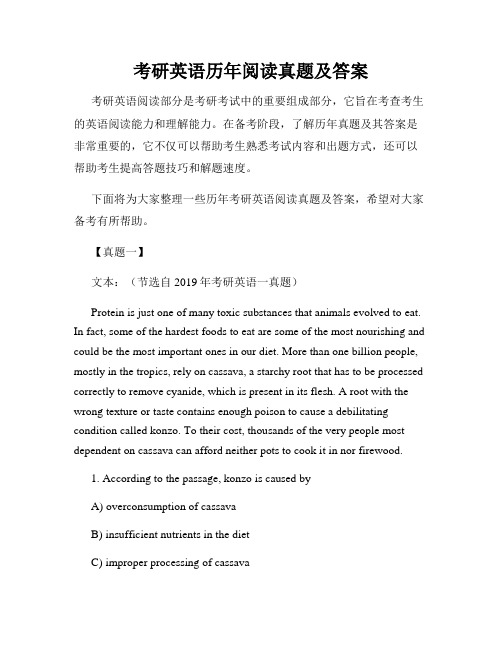
考研英语历年阅读真题及答案考研英语阅读部分是考研考试中的重要组成部分,它旨在考查考生的英语阅读能力和理解能力。
在备考阶段,了解历年真题及其答案是非常重要的,它不仅可以帮助考生熟悉考试内容和出题方式,还可以帮助考生提高答题技巧和解题速度。
下面将为大家整理一些历年考研英语阅读真题及答案,希望对大家备考有所帮助。
【真题一】文本:(节选自2019年考研英语一真题)Protein is just one of many toxic substances that animals evolved to eat. In fact, some of the hardest foods to eat are some of the most nourishing and could be the most important ones in our diet. More than one billion people, mostly in the tropics, rely on cassava, a starchy root that has to be processed correctly to remove cyanide, which is present in its flesh. A root with the wrong texture or taste contains enough poison to cause a debilitating condition called konzo. To their cost, thousands of the very people most dependent on cassava can afford neither pots to cook it in nor firewood.1. According to the passage, konzo is caused byA) overconsumption of cassavaB) insufficient nutrients in the dietC) improper processing of cassavaD) lack of firewood for cooking答案:C) improper processing of cassava【真题二】文本:(节选自2018年考研英语一真题)Certainly, there is no shortage of individual exceptions to the rule, but on the whole, a rising tide of academic research over the last 30 years reports an significant increase in the diversity and complexity of the tasks that people now accomplish in the workplace. Routine analytic tasks requiring repetitive, rule-based work have declined substantially in employment overall.2. According to the passage, what has happened to the number of routine analytic tasks in the workplace?A) They have stayed the same.B) They have increased significantly.C) They have decreased substantially.D) They have become more complex.答案:C) They have decreased substantially.【真题三】文本:(节选自2017年考研英语二真题)Some people’s biometrics change with age, and these systems may ha ve difficulty identifying them over time. For example, studies have shown that facial recognition algorithms are not as accurate at identifying older adults.A study in 2010 found that error rates escalated between the ages of 45 and64.3. According to the passage, what is one limitation of facial recognition algorithms?A) They are inaccurate for older adults.B) They cannot distinguish biometric changes.C) They do not work on people under 45.D) They are not commonly used in studies.答案:A) They are inaccurate for older adults.【真题四】文本:(节选自2016年考研英语二真题)A new study suggests that humans are more prone to overeat in the evening due to the higher calorie content and larger portion sizes typically consumed. The study also found that perceived hunger levels, following a standardized meal, were lower in the morning than in the evening prior to eating the same meal.4. According to the passage, why are humans more likely to overeat in the evening?A) The portion sizes are larger.B) The hunger levels are higher.C) The calorie content is higher.D) The study did not explain the reason.答案:C) The calorie content is higher.以上是几道历年考研英语阅读真题及答案的节选,希望能够帮助考生们更好地备考考研英语阅读部分。
2024年考研英语一真题答案及解析:阅读理解一

2024年考研英语一真题答案及解析:阅读理解一业务课名称:英语考生须知:1.答案必须写在答题纸上,写在其他纸上无效。
2.答题时必须使用蓝、黑色墨水笔或圆珠笔做答,用其他答题不给分,不得使用涂改液。
2024年考研英语一真题答案及解析:阅读理解一(回忆版)Section II Reading ComprehensionPart ADirections:Read the following four texts. Answer the questions after each text by choosing A, B, C or D. Mark your answers on the ANSWER SHEET. (40 points)Text 1Nearly 2,000 years ago, as the Romans began to pull out of Scotland, they left behind a curious treasure: 10 tons of nails, nearly a million of the things. The nail hoard wasdiscovered in 1960 in a four-metre-deep pit covered by two metres of gravel.Why had the Romans buried a million nails? The likely explanation is that the withdrawal was rushed, and they didn’t want the local Caledonians getting their hands on 10 tons of weapon-grade iron. The Romans buried the nails so deep that they would not be discovered for almost two millennia.Later civilisations would value the skilled blacksmith’s labour in a nail even more than the raw material. As Roma Agrawal explains in her new delightful book Nuts and Bolts, early 17th-century Virginians would sometimes burn down their homes if they were planning to relocate. This was an attempt to recover the valuable nails, which could be reused after sifting the ashes. The idea that one might burn down an entire house just to reclaim the nails underlines how scarce, costly and valuable the simple-seeming technology was.The price of nails fell by 90% between the late 1700s and mid-1900s, as economist Daniel Sichel points out in a research paper. According to Sichel, although the falling price of nails was driven partly by cheaper iron and cheaper energy, most of the creditgoes to nail manufacturers who simply found more efficient ways to turn steel into nails.Nails themselves have changed over the years, but Sichel studied them because they haven’t changed much. Roman lamps and Roman chariots are very different from LED strips and sports cars, but Roman nails are still clearly nails. It would be absurd to try to track the changing price of sports cars since 1695, but to ask the same question of nails makes perfect sense.I make no apology for being obsessed by a particular feature of everyday objects: their price. I am an economist, after all. After writing two books about the history of inventions, one thing I’ve learnt is that while it is the enchantingly sophisticated technologies that get all the hype, it’s the cheap technologies that change the world. The Gutenberg printing press transformed civilisation not by changing the nature of writing but by changing its cost —and it would have achieved little without a parallel collapse in the price of surfaces to write on, thanks to an often-overlooked technology called paper. Solar panels had a few niche uses until they became cheap;now they are transforming the global energy system.21. The Romans buried the nails probably for the sake ofA. saving them for future use.B. keeping them from rusting.C. letting them grow in value.D. hiding them from the locals.22. The example of early 17th century Virginians is used toA. highlight the thriftiness of early American colonists.B. illustrate the high status of blacksmiths in that period.C. contrast the attitudes of different civilisations towards nails.D. show the preciousness of nail-making technology at that time.23. What played the major role in lowing the price of nails after the late 1700s?A. Increased productivity.B. Wider use of new energies.C. Fiercer market competition.D. Reduced cost of raw materials.24. It can be learned from Paragraph 5 that nailsA. have undergone many technological improvements.B. have remained basically all the same since Roman times.C. are less studied than other everyday products.D. are one of the world’s most significant inventions.25. Which of the following best summaries the last two paragraphs?A. Cheap technologies bring about revolutionary change.B. Technological innovation is integral to economic success.C. Technology defines people’s understanding of the world.D. Sophisticated technologies develop from small inventions.。
考研英语阅读试题及答案

考研英语阅读试题及答案Passage 1In recent years, the popularity of online education has surged, with millions of students enrolling in courses offered by various platforms. The flexibility and accessibility of online learning have made it an attractive alternative to traditional classroom education. However, critics argue that the quality of online education may not be on par with that of in-person instruction.Questions:61. What is the main topic of the passage?A. The drawbacks of online education.B. The increasing popularity of online education.C. The comparison between online and in-person education.D. The future of traditional classroom education.62. What does the passage suggest about online education?A. It is less popular than traditional education.B. It is criticized for its quality.C. It is only accessible to a select few.D. It has completely replaced classroom education.Answers:61. B62. BPassage 2The concept of a "smart city" has gained traction in urban planning circles. A smart city utilizes information and communication technology to enhance the quality and performance of urban services, to reduce costs, and to improve contact between citizens and government. The implementation of smart city initiatives has the potential to revolutionize the way cities are managed and lived in.Questions:63. What is the focus of the passage?A. The challenges of urban planning.B. The definition of a smart city.C. The benefits of smart city technology.D. The history of urban planning.64. What is the main advantage of a smart city according to the passage?A. Reduced living costs for citizens.B. Improved management of city services.C. Increased citizen-government contact.D. All of the above.Answers:63. B64. DPassage 3Global warming has become a critical issue that affects the entire planet. The increase in greenhouse gases, primarily due to human activities, has led to a rise in global temperatures. This phenomenon has severe consequences, including rising sea levels, more frequent natural disasters, and disruptions to ecosystems. Immediate action is required to mitigate the effects of global warming.Questions:65. What is the main issue discussed in the passage?A. The causes of global warming.B. The effects of global warming.C. The solutions to global warming.D. The history of global warming.66. What is the primary cause of global warming mentioned in the passage?A. Natural disasters.B. Human activities.C. Rising sea levels.D. Disruptions to ecosystems.Answers:65. B66. BPassage 4In the world of business, innovation is key to stayingcompetitive. Companies that embrace change and develop new products, services, and processes are more likely to succeed in the long term. Innovation not only drives growth but also fosters a culture of creativity and problem-solving within an organization.Questions:67. What is the central idea of the passage?A. The importance of problem-solving in business.B. The role of creativity in business innovation.C. The necessity of innovation for business success.D. The impact of new products on business growth.68. What is one of the benefits of innovation mentioned in the passage?A. It reduces costs for companies.B. It creates a culture of creativity.C. It eliminates the need for change.D. It guarantees long-term success.Answers:67. C68. BPassage 5Artificial intelligence (AI) has made significant strides in recent years, with applications ranging from healthcare to finance. AI technologies can analyze large amounts of data, make predictions, and even perform tasks that were oncethought to be the exclusive domain of humans. The ethical implications of AI, however, raise questions about privacy, bias, and accountability.Questions:69. What is the main subject of the passage?A. The history of AI.B. The applications of AI.C. The ethical concerns of AI.D. The limitations of AI.70. What is one of the concerns mentioned about AI?A. Its inability to analyze data.B. Its potential for bias.C. Its high cost.D. Its limited range of applications.Answers:69. B70. B请注意,以上内容是虚构的考研英语阅读试题及答案,仅供格式排版参考。
2000-2004年考研英语阅读理解完美打印版答案
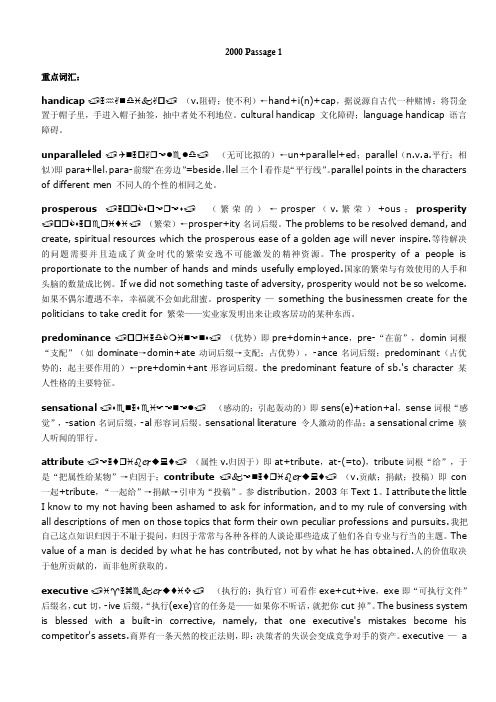
2000 Passage 1重点词汇:handicap ♒✌⏹♎♓✌☐(v.阻碍;使不利)←hand+i(n)+cap,据说源自古代一种赌博:将罚金置于帽子里,手进入帽子抽签,抽中者处不利地位。
cultural handicap 文化障碍;language handicap 语言障碍。
unparalleled ✈⏹☐✌❒☜●♏●♎ (无可比拟的)←un+parallel+ed;parallel(n.v.a.平行;相似)即para+llel,para-前缀“在旁边”=beside,llel三个l看作是“平行线”。
parallel points in the characters of different men 不同人的个性的相同之处。
prosperous ☐❒♦☐☜❒☜♦ (繁荣的)←prosper(v.繁荣)+ous;prosperity ☐❒♦☐♏❒♓♦♓(繁荣)←prosper+ity名词后缀。
The problems to be resolved demand, and create, spiritual resources which the prosperous ease of a golden age will never inspire.等待解决的问题需要并且造成了黄金时代的繁荣安逸不可能激发的精神资源。
The prosperity of a people is proportionate to the number of hands and minds usefully employed.国家的繁荣与有效使用的人手和头脑的数量成比例。
If we did not something taste of adversity, prosperity would not be so welcome.如果不偶尔遭遇不幸,幸福就不会如此甜蜜。
prosperity —something the businessmen create for the politicians to take credit for 繁荣——实业家发明出来让政客居功的某种东西。
2000-2019年考研英语历年真题和答案(英语一)word版

2019考研英语一SectionⅠUse of EnglishDirections:Read the following text. Choose the best word(s) for each numbered blank and mark A, B, C or D on the ANSWER SHEET. (10 points)Today we live in a world where GPS systems, digital maps, and other navigation apps are available on our smart phones. 1 of us just walk straight into the woods without a phone. But phones 2 on batteries, and batteries can die faster than we realize. 3 you get lost without a phone or a compass, and you 4 can’t find north, a few tricks to help you navigate 5 to civilization, one of which is to follow the land...When you find yourself well 6 a trail, but not in a completely 7 area, you have to answer two questions: Which 8 is downhill, in this particular area? And where is the nearest water source? Humans overwhelmingly live in valleys, and on supplies of fresh water. 9 , if you head downhill, and follow any H2O you find, you should 10 see signs of people.If you’ve explored the area before, keep an eye out for familia r sights—you may be 11 how quickly identifying a distinctive rock or tree can restore your bearings.Another 12 : Climb high and look for signs of human habitation. 13 , even in dense forest, you should be ableto 14 gaps in the tree line due to roads, train tracks, and other paths people carve 15 the woods. Head toward these 16 to find a way out. At night, scan the horizon for 17 light sources, such as fires and streetlights, then walk toward the glow of light pollution.18 , assuming you’re lost in an area humans tend to frequent, look for the 19 we leave on the landscape. Trail blazes, tire tracks, and other features can 20 you to civilization.1. [A]Some [B]Most [C]Few [D]All2. [A]put[B]take[C]run [D]come3. [A]Since [B] If [C] Though [D]Until4. [A]formally [B] relatively [C] gradually [D] literally5. [A] back [B] next [C] around [D] away6. [A]onto [B]off[C]across [D]alone7. [A]unattractive[B] uncrowded [C]unchanged [D]unfamiliar8. [A] site[B]point [C]way [D]place9. [A] So [B] Yet [C]Instead [D]Besides10. [A]immediately [B] intentionally [C]unexpectedly [D] eventually11. [A]surprised [B]annoyed [C]frightened [D]confused12. [A] problem [B]option [C]view [D]result13. [A] Above all [B]In contrast [C] On average [D] For example14. [A]bridge [B]avoid [C]spot [D]separate15. [A] from [B] through [C]beyond [D] under16. [A] posts [B]links [C]shades [D]breaks17. [A] artificial [B] mysterious [C] hidden [D] limited18. [A] Finally [B] Consequently [C] incidentally [D] Generally19. [A] memories [B] marks [C] notes [D] belongings20. [A] restrict [B] adopt [C] lead [D] expose1-20参考答案及解析:1. 生活在一个GPS系统,数字地图和其他导航应用程序都在我们的智能手机上轻易获取”。
- 1、下载文档前请自行甄别文档内容的完整性,平台不提供额外的编辑、内容补充、找答案等附加服务。
- 2、"仅部分预览"的文档,不可在线预览部分如存在完整性等问题,可反馈申请退款(可完整预览的文档不适用该条件!)。
- 3、如文档侵犯您的权益,请联系客服反馈,我们会尽快为您处理(人工客服工作时间:9:00-18:30)。
2012年考研真题阅读部分Text 1Come on –Everybody’s doing it. That whispered message, half invitation and half forcing, is what most of us think of when we hear the words peer pressure. It usually leads to no good-drinking, drugs and casual sex. But in her new book Join the Club, Tina Rosenberg contends that peer pressure can also be a positive force through what she calls the social cure, in which organizations and officials use the power of group dynamics to help individuals improve their lives and possibly the word.Rosenberg, the recipient of a Pulitzer Prize, offers a host of example of the social cure in action: In South Carolina, a state-sponsored antismoking program called Rage Against the Haze sets out to make cigarettes uncool. In South Africa, an HIV-prevention initiative known as LoveLife recruits young people to promote safe sex among their peers.The idea seems promising,and Rosenberg is a perceptive observer. Her critique of the lameness of many pubic-health campaigns is spot-on: they fail to mobilize p eer pressure for healthy habits, and they demonstrate a seriously flawed understanding of psychology.” Dare to be different, please don’t smoke!” pleads one billboard campaign aimed at reducing smoking among teenagers-teenagers, who desire nothing more than fitting in. Rosenberg argues convincingly that public-health advocates ought to take a page from advertisers, so skilled at applying peer pressure.But on the general effectiveness of the social cure, Rosenberg is less persuasive. Join the Club is filled with too much irrelevant detail and not enough exploration of the social and biological factors that make peer pressure so powerful. The most glari ng flaw of the social cure as it’s presented here is that it doesn’t work very well for very long. Rage Against the Haze failed once state funding was cut. Evid ence that the LoveLife program produces lasting changes is limited and mixed.There’s no doubt that our peer groups exert enormous influence on our behavior. An emerging body of research shows that positive health habits-as well as negative ones-spread through networks of friends via social communication. This is a subtle form of peer pressure: we unconsciously imitate the behavior we see every day.Far less certain, however, is how successfully experts and bureaucrats can select our peer groups and steer their activities in virtuous directions. It’s like the teacher who breaks up the troublemakers in the back row by pairing them with better-behaved classmates. The tactic never really works. And that’s the problem with a social cure engineered from the outside: in the real world, as in school, w e insist on choosing our own friends.21. According to the first paragraph, peer pressure often emerges as[A] a supplement to the social cure[B] a stimulus to group dynamics[C] an obstacle to school progress[D] a cause of undesirable behaviors22. Rosenberg holds that public advocates should[A] recruit professional advertisers[B] learn fro m advertisers’ experience[C] stay away from commercial advertisers[D] recognize the limitations of advertisements23. In the author’s view, Rosenberg’s book fails to[A] adequately probe social and biological factors[B] effectively evade the flaws of the social cure[C] illustrate the functions of state funding[D]produce a long-lasting social effect24. Paragraph 5shows that our imitation of behaviors[A] is harmful to our networks of friends[B] will mislead behavioral studies[C] occurs without our realizing it[D] can produce negative health habits25. The author suggests in the last paragraph that the effect of peer pressure is[A] harmful[B] desirable[C] profound[D] questionableText 2A deal is a deal-except, apparently ,when Entergy is involved. The company, a major energy supplier in New England, provoked justified outrage in Vermont last week when it announced it was reneging on a longstanding commitment to abide by the strict nuclear regulations.Instead, the company has done precisely what it had long promised it would not challenge the constitutionality of Vermont’s rules in t he federal court, as part of a desperate effort to keep its Vermont Yankee nuclear power plant running. It’s a stunning move.Th e conflict has been surfacing since 2002, when the corporation bought Vermont’s only nuclear power plant, an aging reactor in Vernon. As a condition of receiving state approval for the sale, the company agreed to seek permission from state regulators to operate past 2012. In 2006, the state went a step further, requiring that any extension of the plant’s license be subject to Vermont legislature’s approv al. Then, too, the company went along.Either Entergy never really intended to live by those commitments, or it simply didn’t foresee what would happen next. A stri ng of accidents, including the partial collapse of a cooling tower in 207 and the discovery of an underground pipe system leakage, raised serious questions about both Vermont Yankee’s safety and Entergy’s management– especially after the company made misleading statements about the pipe. Enraged by Entergy’s behavior, the Vermont Senate voted 26 to 4 last year against allowing an ex tension.Now the company is suddenly claiming that the 2002 agreement is invalid because of the 2006 legislation, and that only the federal government has regulatory power over nuclear issues. The legal issues in the case are obscure: whereas the Supreme Court has ruled that states do have some regulatory authority over nuclear power, legal scholars say that Vermont case will offer a precedent-setting test of how far those powers extend. Certainly, there are valid concerns about the patchwork regulations that could result if every state sets its own rules. But had Entergy kept its word, that debate would be beside the point.The company seems to have concluded that its reputation in Vermont is already so damaged that it has noting left to lose by going to war with the state. But there should be consequences. Permission to run a nuclear plant is a poblic trust. Entergy runs 11 other reactors in the United States, including Pilgrim Nuclear station in Plymouth. Pledging to run Pilgrim safely, the company has applied for federal permission to keep it open for another 20 years. But as the Nuclear Regulatory Commission (NRC) review s the company’s application, it should keep it mind what promises from Entergy are worth.26. The phrase “reneging on”(Line 3.para.1) is closest in meaning to[A] condemning.[B] reaffirming.[C] dishonoring.[D] securing.27. By entering into the 2002 agreement, Entergy intended to[A] obtain protection from Vermont regulators.[B] seek favor from the federal legislature.[C] acquire an extension of its business license .[D] get permission to purchase a power plant.28. According to Paragraph 4, Entergy seems to have problems with its[A] managerial practices.[B] technical innovativeness.[C] financial goals.[D] business vision29. In the author’s view, the Vermont case will test[A] Entergy’s capacity to fulfill all its promises.[B] the mature of states’ patchwork regulations.[C] the federal authority over nuclear issues .[D] the limits of states’ power over nuclear issues.30. It can be inferred from the last paragraph that[A] Entergy’s business elsewhere might be affected.[B] the authority of the NRC will be defied.[C] Entergy will withdraw its Plymouth application.[D] Vermont’s reputation might be damaged.Text 3In the idealized version of how science is done, facts about the world are waiting to be observed and collected by objective researchers who use the scientific method to carry out their work. But in the everyday practice of science, discovery frequently follows an ambiguous and complicated route. We aim to be objective, but we cannot escape the context of our unique life experience. Prior knowledge and interest influence what we experience, what we think our experiences mean, and the subsequent actions we take. Opportunities for misinterpretation, error, and self-deception abound.Consequently, discovery claims should be thought of as protoscience. Similar to newly staked mining claims, they are full of potential. But it takes collective scrutiny and acceptance to transform a discovery claim into a mature discovery. This is the credibility process, through which the individual researcher’s me, here, now becomes the community’s anyone, anywhere, anytime. Objective knowledge is the goal, not the starting point.Once a discovery claim becomes public, the discoverer receives intellectual credit. But, unlike with mining claims, the community takes control of what happens next. Within the complex social structure of the scientific community, researchers make discoveries; editors and reviewers act as gatekeepers by controlling the publication process; other scientists use the new finding to suit their own purposes; and finally, the public (including other scientists) receives the new discovery and possibly accompanying technology. As a discovery claim works it through the community, the interaction and confrontation between shared and competing beliefs about the science and the technology involved transforms an individual’s discovery claim into the community’s credible discovery.Two paradoxes exist throughout this credibility process. First, scientific work tends to focus on some aspect of prevailing Knowledge that is viewed as incomplete or incorrect. Little reward accompanies duplication and confirmation of what is already known and believed. The goal is new-search, not re-search. Not surprisingly, newly published discovery claims and credible discoveries that appear to be important and convincing will always be open to challenge and potential modification or refutation by future researchers. Second, novelty itself frequently provokes disbelief. Nobel Laureate and physiologist Albert Azent-Gyorgyi once described discovery as “seeing what everybody has seen and thinking what nobody has thought.” But thinking what nobody else has thought and telling others what they have missed may not change their views. Sometimes years are required for truly novel discovery claims to be accepted and appreciated.In the end, credibility “happens” to a discovery claim – a process that corresponds to what philosopher Annette Baier has described as the commons of the mind. “We reason together, challenge, revise, and complete each other’s reasoning and each other’s conceptions of reason.”31. According to the first paragraph, the process of discovery is characterized by its[A] uncertainty and complexity.[B] misconception and deceptiveness.[C] logicality and objectivity.[D] systematicness and regularity.32. It can be inferred from Paragraph 2 that credibility process requires[A] strict inspection.[B]shared efforts.[C] individual wisdom.[D]persistent innovation.33.Paragraph 3 shows that a discovery claim becomes credible after it[A] has attracted the attention of the general public.[B]has been examined by the scientific community.[C] has received recognition from editors and reviewers.[D]has been frequently quoted by peer scientists.34. Albert Szent-Györgyi would most likely agree that[A] scientific claims will survive challenges.[B]discoveries today inspire future research.[C] efforts to make discoveries are justified.[D]scientific work calls for a critical mind.35.Which of the following would be the best title of the test?[A] Novelty as an Engine of Scientific Development.[B]Collective Scrutiny in Scientific Discovery.[C] Evolution of Credibility in Doing Science.[D]Challenge to Credibility at the Gate to Science.Text 4If the trade unionist Jim my Hoffa were alive today, he would probably represent civil servant. When Hoffa’s Teamsters were in their prime in 1960, only one in ten American government workers belonged to a union; now 36% do. In 2009 the number of unionists in America’s public sector passed that of their fellow members in the private sector. In Britain, more than half of public-sector workers but only about 15% of private-sector ones are unionized.There are three reasons for the public-sector unions’ thriving. First, they can shut things down without suffering much in the way of consequences. Second, they are mostly bright and well-educated. A quarter of America’s public-sector workers have a university degree. Third, they now dominate left-of-centre politics. Some of their ties go back a long way. Britain’s Labor Party, as its name implies, has long been associated with trade unionism. Its current leader, Ed Miliband, owes his position to votes from public-sector unions.At the state level their influence can be even more fearsome. Mark Baldassare of the Public Policy Institute of California points out that much of the state’s budget is patrolled by unions. The teachers’ unions keep an eye on schools, the CCPOA on prison s and a variety of labor groups on health care.In many rich countries average wages in the state sector are higher than in the private one. But the real gains come in benefits and work practices. Politicians have repeatedly “backloaded” public-sector pay deals, keeping the pay increases modest but adding to holidays and especially pensions that are already generous.Reform has been vigorously opposed, perhaps most egregiously in education, where charter schools, academies and merit pay all faced drawn-out battles. Even though there is plenty of evidence that the quality of the teachers is the most important variable, teacher s’ unions have fought against getting rid of bad ones and promoting good ones.As the cost to everyone else has become clearer, politicians have begun to clamp down. In Wisconsin the unions have rallied thousands of supporters against Scott Walker, the hardline Republican governor. But many within the public sector suffer under the current system, too.John Donahue at Harvard’s Ke nnedy School points out that the norms of culture in Western civil services suit those who want to stay put but is bad for high achievers. The only American public-sector workers who earn well above $250,000 a year are university sports coaches and the pre sident of the United States. Bankers’ fat pay packets have attracted much criticism, but a public-sector system that does not reward high achievers may be a much bigger problem for America.36. It can be learned from the first paragraph that[A] Teamsters still have a large body of members.[B] Jimmy Hoffa used to work as a civil servant.[C] unions have enlarged their public-sector membership.[D]the government has improved its relationship with unionists.37. Which of the following is true of Paragraph 2?[A] Public-sector unions are prudent in taking actions.[B] Education is required for public-sector union membership.[C] Labor Party has long been fighting against public-sector unions.[D]Public-sector unions seldom get in trouble for their actions.38. It can be learned from Paragraph 4 that the income in the state sector is[A] illegally secured.[B] indirectly augmented.[C] excessively increased.[D]fairly adjusted.39. The example of the unions in Wisconsin shows that unions[A]often run against the current political system.[B]can change people’s political attitudes.[C]may be a barrier to public-sector reforms.[D]are dominant in the government.40. John Donahue’s attitude towards the public-sector system is one of[A]disapproval.[B]appreciation.[C]tolerance.[D]indifference.答案:21.【答案】D【解析】文章首段包含了两方面的内容,作者先简单介绍Peer pressure,再引出Tina Rosenberg在她的新书Join the Club中对于peer pressure的看法,这篇文章是以一篇书评的形式出现。
